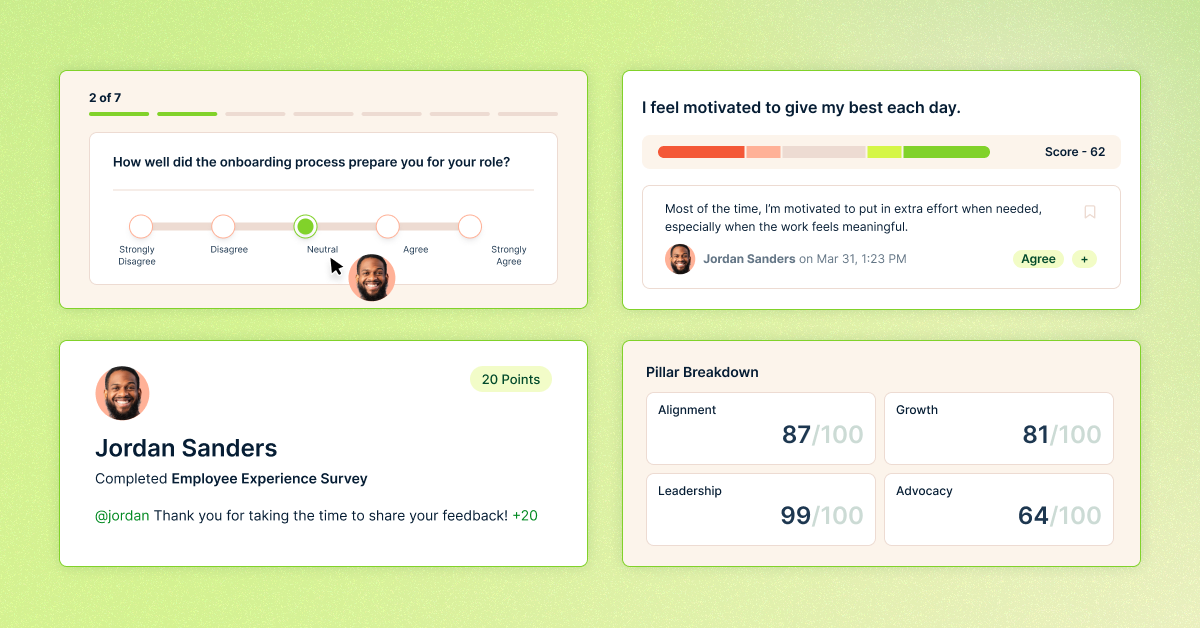11 Employee Engagement Statistics For Your Business In 2025

In recent years, employee engagement has become essential. Having a job isn't enough for today's workers. Employees understand that they spend countless hours at work each day, and they want to enjoy that time as much as possible. Increasing engagement can profoundly impact job satisfaction and how long your team members stick around.
To delve deeper into this phenomenon, we conducted a comprehensive survey of 1,000 employees, covering various aspects of engagement. We are thrilled to share our employee engagement statistics, which we believe can provide valuable insights for your organization's engagement strategies.
1. 22% Of Employees Have High Engagement
When we calculated how many employees experienced high levels of engagement at work, only 22% of the employees we surveyed fell into this category.
High engagement, as we discovered, is a formidable challenge for many companies. It's not just about providing a job; it's about creating an environment where employees can thrive and feel valued.

How Did We Measure Employee Engagement
At Nectar, we approached the study of employee engagement with a comprehensive methodology. We considered various factors such as pay, recognition, psychological safety, and confidence in the company. Each employee was evaluated based on their responses to a set of questions, which you can find below. This approach allowed us to categorize respondents into low, medium, and high engagement levels.
- I am paid well for what I do.
- I receive meaningful recognition at work.
- I have a great work/life balance.
- I feel safe to share my opinions at work.
- My company lives its core values.
- I have confidence in the direction my company is taking.
- I have positive workplace relationships with my colleagues.
- My company is great at communication.
- My company has a culture that I enjoy.
- I am proud to work for my company.
Each of these questions had Yes/No responses. When employees said yes, they got a point. Based on that, employees could say yes to 0-10 questions. We divided respondents into low, medium, and high engagement using that data.
- Low Engagement: These employees said yes to 0-5 of our engagement questions. 32% of the workers we surveyed fell into this category.
- Medium Engagement: These employees said yes to 6-8 of our engagement questions. 46% of survey respondents fell in this category.
- High Engagement: These respondents said yes to 9-10 of our employee engagement questions. Only 22% of employees fell in this category.
Understanding The Messy Middle
There is a large group of employees who are stuck in the middle. They could easily feel a bit more confident at work and become highly engaged, but they could just as easily have a few bad months and have low engagement.
Understanding the messy middle of employee engagement is challenging for many employers, but it's worth tackling. By maximizing the number of team members who are happy and engaged, you can significantly reduce turnover and retain valuable internal knowledge.
Part of understanding this messy middle is understanding which questions on our survey got the lowest responses. Check out the next section for a deep dive into each question on our survey and more employee engagement statistics.
2. Breaking Down Nectar's Employee Engagement Survey Results
Each question we asked varied in the response we received. Some questions, like having positive relationships with colleagues, got high scores. On the opposite end, questions around internal communications and recognition scored lowest.
1. 62% Of Employees Feel They Are Paid Well For What They Do
Pay equity is an important issue for employees. As inflation continues to raise the cost of living, employees need a higher salary to feel comfortable. When employees are paid well for their work, they can focus on building the company instead of paying bills.
Based on previous research, it's no surprise that this question is answered vastly differently based on gender. While 71% of men feel they are paid well for what they do, only 49% of women feel the same way. Unfortunately, there is still a gender gap when it comes to pay. If employers want to improve their engagement scores, it's important to consider the pay gaps that tend to exist between different worker demographics.

2. 54% Of Employees Say They Receive Meaningful Recognition At Work
Many team members need to feel recognized for their work. According to our recent employee recognition statistics, frequent and meaningful recognition impacts engagement, motivation, productivity, and so much more. Unfortunately, many of the employees we surveyed shared that they don't get meaningful recognition at work. This was the second lowest-rated question on our engagement survey.
Certain groups seem to have a more difficult time receiving meaningful recognition at work. As seen in our recent gender recognition gap article, women get less meaningful feedback. While 57% of men said yes to this question, only 50% of women shared the same response. Older employees are also more likely to be left out, as only 45% of employees 55+ shared they get meaningful recognition.

3. 66% Of Employees Say They Have A Great Work/Life Balance
Having a good work/life balance is crucial for employees. Being able to put work down and enjoy time off is a must for happy and healthy employees. No one can work all the time. Unfortunately, 34% of our respondents shared that they didn't have a great work/life balance.
Based on our data, men have more difficulty creating a great work/life balance. While 69% of women say they have a great work/life balance, only 64% of men say the same. Since employee burnout is a real challenge that teams face, it's important to consider how we can help more of our team members balance all aspects of their day-to-day lives.

4. 63% Of Employees Feel Safe To Share Their Opinions At Work
If you disagreed with your manager or a team member, would you feel comfortable stepping up and saying something? For 37% of the employees we surveyed, sharing their opinions at work isn't something they feel safe doing. Psychological safety builds better workplaces and is a key part of employee engagement. Being in an environment where workers feel uncomfortable standing up leads to complacency and important issues falling through the cracks.
Sharing opinions at work seems less safe for women and employees at companies with over 5,000 team members. Only 59% of women felt safe, and only 58% of employees at large companies felt safe.

5. 62% Of Employees Say Their Company Lives Its Core Values
Does your company practice its core values, or are they just theoretical? For some companies, core values become a decorative poster hung up in the break room. The best companies take their values to heart and use them to make decisions for the organization, employees, customers, and the communities they live in. 38% of the employees we surveyed shared that they don't think their company lives its core values.
Only 57% of employees who work at small companies (26-250 workers) feel that their company lives its core values. This is an unfortunate foundation for many teams to start on. While these numbers improve, with 66% of employees working in medium companies (251-1,000 workers) feeling like their company lives its values, it decreases to 58% for large companies (1,001+ workers.) Returning to basics and living your values is a great way to boost engagement.

6. 66% Of Employees Feel Confident In The Direction Their Company Is Taking
Would you follow your company? Is it going in a positive direction? For 34% of the workers we surveyed, confidence in company direction is lacking. Improving employee trust in leadership is crucial to increasing engagement and tenuring workers longer. There's a reason that sites like Glassdoor track CEO approval and business outlook: many people want to know that you have a solid foundation before they join.
Employees at medium-sized companies (251-1,000 workers) seem to have the most confidence in their company's direction, as 74% of those employees feel confident. On the other hand, only 60% of employees who work at large companies (1,001+ workers) feel confident.

7. 83% Of Employees Say They Have Positive Relationships With Their Colleagues
The engagement survey question with the highest response concerns positive relationships with colleagues. When we surveyed employees about workplace connection, 77.63% of the workers considered workplace connection to be important for achieving a great company culture. Since employees value positive workplace relationships so much, it's great that most of the workers we surveyed have this experience.

8. 45% Of Employees Say Their Company Is Great At Communication
When we surveyed employees, the lowest score was related to communication. Having an internal communications strategy is key to helping your team feel engaged. Your team wants to be kept in the loop on everything happening in the office.
As companies grow, this becomes harder to accomplish. In fact, 34% of employees who answered no to this question worked at a company with 1,001+ employees.

9. 57% Of Workers Say Their Company Has A Culture They Enjoy
Many organizations work tirelessly to create a great company culture. Since employees spend so much time at work, it's crucial for them to work in a decent environment. Unfortunately, many companies aren't hitting the mark when it comes to culture-building. 43% of the workers we surveyed shared that their company doesn't have a culture they enjoy.
Companies across various demographics are dealing with poor company culture. Organizations must continue to address this gap and focus on building a culture that people won't want to leave.

10. 74% Of Workers Say They Are Proud To Work For Their Company
Lastly, we asked employees if they were proud to work for their company. Many of the workers we surveyed shared their pride, which is promising, but there is still room to grow. For the 26% of employees who aren't proud of their company, it may be challenging to feel engaged in the organization long-term.

3. 81.5% Of Employees Feel That They Are Engaged At Work
To compare, we asked each respondent how they felt about their engagement at work. While the standards of our survey found that 22% of the employees we surveyed fell into the high engagement category and 46% fell into the medium engagement category, employees feel that they are way more engaged. 81.5% of the workers we surveyed said they feel engaged.
To open up our survey, we shared a simple definition of employee engagement with every participant:
Employee engagement is how invested people are in both their everyday work and the success of the business as a whole. Engaged employees have a positive emotional connection with the company and feel a sense of purpose in their jobs.
This definition set the tone for the survey and helped ensure everyone was on the same page about engagement.

How Feeling Engaged Impacts Scores
While we feel that employees are less engaged than they report, it showed up in our data when they reported that they were not engaged.
Employees who answered no to the question, "Do you think that you are engaged at work?" shared far more negative reactions to our engagement survey. On average, there was a 24% difference between the answers given by employees who felt they were engaged and the ones who felt they weren't.
This difference was more notable in questions about company culture and pride in working for their organizations. Each of these questions showed a 30%+ difference between engaged and unengaged employees.

4. 64% Of Employees Say That Their Work Experience Is Impacted When Other Employees Are Disengaged At Work
Do employees around you impact your work experience? For 64% of our survey respondents, when their teammates are disengaged, their work experience is affected.
When team members are disengaged, it creates a stressful work environment for everyone. Other employees are introduced to a potentially toxic environment, and they often have to step up to cover for team members who aren't doing their jobs.
- 70% of employees between the ages of 35 and 44 feel that disengaged workers impact their experience.
- 65% of men feel that disengaged employees impact their work experience.
- 66% of employees at companies with 1,000+ workers share that disengaged team members impact their work experience.

5. 70% Of Employees Feel That Their Colleagues Are Engaged At Work
While 81.5% of the employees we surveyed felt they were engaged, the sentiment isn't shared when it comes to their colleagues. Only 70% of the workers we surveyed felt that their colleagues were engaged at work.
This discrepancy is significant because, as we discussed, 64% of employees feel their work experience is impacted when other workers are disengaged. Of employees who don't feel their colleagues are engaged, 69% feel that their work experience is impacted when their coworkers are disengaged.
Women were less likely to feel that their colleagues were engaged at work. While 74% of men said yes to this question, only 64% of women said the same thing.

6. 71% Of Employees Would Recommend Their Organization As A Great Place To Work
One of the best ways to expand your team early on is through referrals. Referral programs can help you find new talent, but they require your employees to love where they work and recommend it to their network.
Overall, many of our survey respondents would recommend their company as a great place to work. Here are a few groups who were more likely to recommend their companies:
- 76% of men would recommend their organization as a great workplace.
- 76% of employees between the ages of 35-44 would recommend their organization as a great place to work.
- 75% of employees with a post-graduate degree recommend their organization as a great place to work.

7. 56% Of Employees Say They Feel Employee Engagement Is A Significant Focus At Their Company
Even if you emphasize engagement at your company, do your employees know it?
Here are a few more interesting statistics on this topic:
- 61% of men say that engagement is a focus at their company.
- 60% of employees between the ages of 35-44 say that engagement is a focus.
- 62% of employees who make $150,000+ consider engagement a focus at their organization.
Companies can showcase that engagement is important to them by investing in engagement surveys, improving areas that score lower in those surveys, and having regular 1:1s with employees.

How Does Engagement Focus Impact Survey Scores?
When employees felt that their company focused on engagement, it had a real impact on their engagement scores. For every question besides "I have positive workplace relationships with my colleagues," we spotted a double-digit difference in how employees scored the engagement survey.
The following questions had a 30%+ difference between these two groups:
- I receive meaningful recognition at work. (37%)
- My company lives its core values. (37%)
- I have confidence in the direction my company is taking. (40%)
- My company is great at communication. (36%)
- My company has a culture that I enjoy. (30%)

8. 43% Of Employees Share That Workplace Challenges Improve Their Engagement
Employee challenges can be a great way to improve engagement with your team. From wellness initiatives to employer branding activities, your challenges can benefit both the company and employees.
- 48% of the men we surveyed shared that these challenges improve their engagement.
- 67% of employees aged 18-34 agreed that these challenges improve their engagement.
- 42% of employees who work at companies with 26-250 employees feel that these types of challenges improve their engagement.
At Nectar, we believe in the value of challenges. Our Plus plan comes with access to our challenges feature, which allows companies to create interesting challenges across a variety of categories. Many of our customers create challenges around health/wellness, recruiting, professional development, and employer branding.

9. 46% Of Employees Say That Peers Have The Most Impact On Their Engagement
When you are trying to create an engaging environment, your team makes a huge difference. Employees need to feel recognized, have a great work/life balance, feel pride in the organization, and so much more to feel engaged. At the heart of it, people significantly impact how employees perceive their work.
According to the workers we surveyed, peers have the most significant impact on this experience. For the other team members we surveyed, 33% say managers have the biggest impact, and 21% say the company CEO/executive team makes the biggest impact.
Breaking this data down into demographics reveals the following results:
- Overall, men rate managers more important than peers when it comes to impact on engagement.
- Peers rank higher for 18-24 and 54+ year olds, but managers rank higher for employees between the ages of 25-54.
- Employees with post-graduate degrees rank managers as more important, but every other educational group ranks peers as most important.

10. 43.5% Of Employees Say Their Companies Send Out An Engagement Survey
One way that companies can gauge engagement is by sending a survey to their team. These surveys tend to be quick and potentially anonymous ways for employees to share their thoughts and experiences with the company.

Most of the employees we surveyed (56.5%) shared that their company did not send an engagement survey. The rest shared that they got engagement surveys at various intervals.
- 20% send monthly surveys.
- 31% send quarterly surveys.
- 11% send biannual surveys.
- 38% send yearly surveys.

Employees who work for companies that send engagement surveys, scored 9.5% higher (on average) on our engagement survey than employees who work for companies that don't send them.

Yearly Engagement Surveys Are The Most Common But Not The Most Effective
The most common interval for engagement surveys was yearly. Annual surveys are a good start, but they don't have the pull that you might expect. In some cases, employees who got yearly surveys scored worse on our engagement survey than employees who got no survey at all.

Based On Our Data, Quarterly Engagement Surveys Make The Best Impact
31% of employees who get an engagement survey got one quarterly. The most interesting employee engagement statistic? These team members scored 15% higher (on average) in our engagement survey than employees who work for companies that don't send them.

11. 71% Of Employees Need To Feel Engaged To Stay At A Company Long-Term
Does engagement actually matter to employees? Can companies get away with a disengaging environment? According to our statistics, employees want to feel engaged, and many of them need it to stay at a company long-term. Employee retention and turnover are huge issues for companies of all sizes, so it's essential to think about topics like engagement as a way to create cultures that people won't want to leave.
Here are a few specific instances where engagement is crucial to employee tenure.
- 73% of men need to feel engaged to stay long-term vs. 68% of women.
- 77% of employees between the ages of 35-44 need to feel engaged to stay long-term.
- 75% of post-graduate degree earners and 70% of university degree owners need to feel engaged to stay long-term.

Embrace Employee Engagement Statistics With This Fresh Data
Are you ready to create a better culture for your team? By focusing on employee engagement strategies, you can build an employee experience that bests your competition. Many employees end up teetering on the edge and only being mildly engaged when a few fixes to the organization could be the key to a more profound experience for them. It's important for organizations to consider what their weak spots are so they can fix them.
Here are some main takeaways from today's statistics:
- Employees aren’t as engaged as they think they are, but if employees feel engaged, it can have a positive impact on engagement scores.
- Peers have the most profound impact on engagement, so it’s important for companies to find great culture adds and focus on creating a more engaging organization.
- Simple strategies like workplace challenges can help employees feel more excited about their organization.
- While yearly engagement surveys are the most common, quarterly surveys have a more significant impact on scores. Quarterly surveys allow companies to make adjustments to engagement more frequently.
- Engagement impacts tenure since most employees agree that they need to be engaged to stay at a company long-term.
As you can see from our data, there are a few areas where engagement tends to lack: recognition and internal communications. Nectar can be a fantastic solution to help you increase the recognition that your team members get. Our customers, PropLogix, saw a near-perfect recognition score on their engagement survey after using our tools to praise their team. Sign up for a demo to see how Nectar can help you improve your engagement scores and create a happier workforce.














